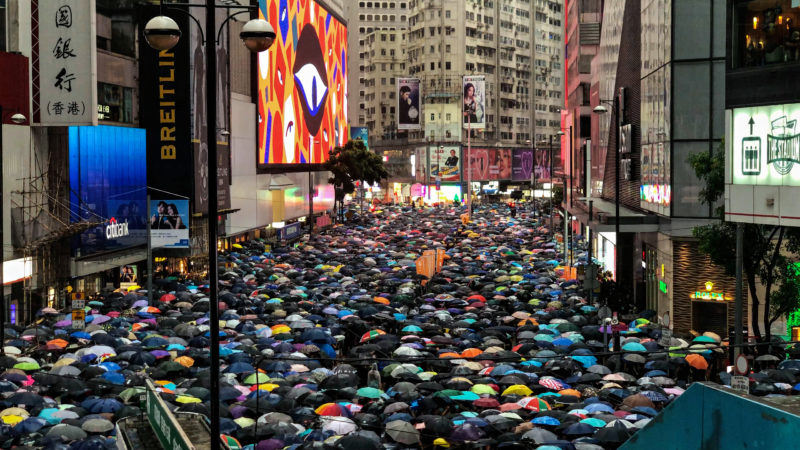
After China unilaterally imposed its national security law on Hong Kong, effectively subverting the rule of law in the territory, democracy activists are bracing for months of political confrontation. It’s time for the UK labour movement to show active solidarity with them.
Last weekend, more than 600,000 people – one tenth of the electorate – participated in primaries for Power for Democracy, an umbrella group that intends to contest elections in September for the ruling legislative council. The results were skewed heavily in favour of candidates favouring a strategy of resistance to China’s crackdown, not compliance.
Carrie Lam’s pro-Beijing administration immediately accused the selected candidates of “threatening fair elections”. Now they have been accused of breaching the national security law itself and face the prospect of being barred from standing.
The Tories, who for years regarded China’s human rights record as a tiresome distraction, have now flipped to President Trump-style rhetoric, ordering the removal of Huawei’s 5G equipment from the UK and using as a threat against China a possible commitment to accept three million Hong Kong residents into the UK.
Labour must speak on China with a distinctive voice, which genuinely seeks to defend human rights – not just in parliament but across the movement. That’s why we’ve set up the Labour Movement Solidarity with Hong Kong (UK), an alliance of people from all wings of the party who want Labour to take consistent action in defence of democratic rights in Hong Kong.
We’ve been holding online rallies and briefings with activists from the Hong Kong trade union movement whose very existence is a thorn in the side of the cheap labour bosses across the border in Guangdong. On Saturday, July 18th, we’ll be hearing from Lee Cheuk Yan, a prominent leader in the HKCTU and the Hong Kong Labour Party, who has taken a prominent role in the democracy demonstrations.
Stephen Kinnock, Labour’s shadow minister for Asia and the Pacific, will speak alongside MPs, including John McDonnell and Nadia Whittome, trade union activists, and Promise Li, a socialist activist from HK-based leftist organisation Lausan.
Since Xi Jin Ping took office, the unofficial labour movement in China’s sweatshops, the migrant rights movements, the journalists fighting for free speech and those fighting for more plurality and diversity inside the party have all suffered reverses.
Where independent trade union activists and labour lawyers once could operate freely in places like Guangdong, organising from physical centres and co-ordinating strikes via social media, they are now largely reduced to cultural work and basic social support activity.
The Jasic strike in 2018 saw left-wing and feminist students in Beijing together with migrant workers in the industrial heartlands organise around explicitly socialist demands and around rank and file workplace activism. It exemplified what the party bureaucrats fear most.
For the CCP, Hong Kong’s semi-democratic system – flawed though it is – stands not just as a symbolic political alternative to a one-party surveillance state: it allows the left and the labour movement in Hong Kong to deliver active solidarity across the border to workers in struggle.
The coronavirus pandemic has intensified geopolitical rivalry between the USA and China, with the White House now designating Beijing as a strategic competitor. In the UK, much of the political running is being made by right-wing Tory MPs whose strategy and rhetoric aligns with that of right-wing Republicans, people who care little for human rights and labour rights in their own countries. Trump and his allies are stoking up anti-Chinese racism and xenophobia, and during the pandemic that has clearly begun to resonate here.
Labour must take a strong, independent, internationalist stance, showing solidarity with workers both in the PRC and Hong Kong, with democrats and free speech advocates, and with minorities like the Uighur people without becoming part of Trump’s anti-China bandwagon.
In some parts of the labour movement, there is ignorance and denial about what the Xi regime is doing. The Morning Star newspaper, funded by UK trade unions, regularly casts the Hong Kong protesters as reactionaries. It has downplayed Hong Kong police brutality, even showcasing pleas from pro-Beijing stooges on the LegCo to supply them with tear gas, and actually justifying the national security law.
We should instead have a strong, principled alternative voice inside our movement, which can simultaneously tell the truth about Beijing’s attacks on human rights – from Hong Kong to Xinjiang, where a million Uighur people have been herded into “re-education camps” – and oppose Trump’s anti-Chinese rhetoric and racism.
Above all, if hundreds of thousands of Hong Kong people are forced to use their right to relocate to the UK, we need to make sure that our party welcomes them, both to our country and our movement. What the movement does in Britain matters both to the protesters and to those co-ordinating the crackdown from Beijing. Let’s make sure the voices of internationalism, workers’ solidarity and democracy are louder inside our movement than those supporting the authoritarian state.




More from LabourList
Ashley Dalton resigns as health minister for cancer treatment
Paul Nowak column: ‘Labour must focus on the basics’
‘Labour’s two-child cap victory rings hollow while asylum-seeking children remain in poverty’